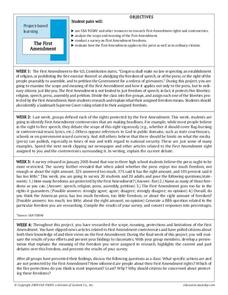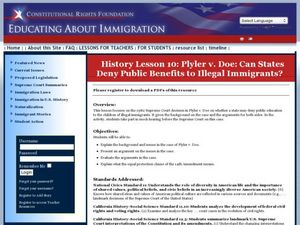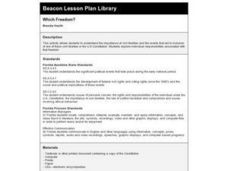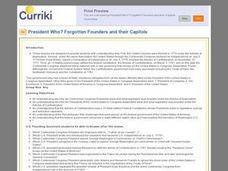Curated OER
The First Amendment
Eleventh graders examine the First Amendment. In this US Government lesson plan, 11th graders analyze the scope and meaning of the first amendment. Students conduct a survey on First Amendment freedoms. Student evaluate...
Curated OER
History Lesson 10: Plyler v. Doe: Can States Deny Public Benefits to Illegal Immigrants?
High schoolers consider the rights of illegal immigrants. For this illegal immigration lesson, students analyze the Supreme Court case Plyler v. Doe and determine whether illegal immigrants should have access to public benefits. High...
Curated OER
Which Freedom?
Fourth graders choose on the freedoms in the Bill of Rights and research it on the internet. They answer specific questions using their research and produce a written document using a computer.
Curated OER
What is Due Process Anyway?
Students examine the term due process and its historical origins. They compare and constrast the requirements of due process in the United States Constitution and the Indiana Constitution. They also discuss the difference between...
Curated OER
The Changing Meaning of "Due Process"
Students examine the United States Constitution and how the application for due process differs in two amendments. They research the changing definition of the term since the Civil War. They use the internet to research press coverage of...
Curated OER
The Formation and Function of the Supreme Court
Students analyze the role of the U.S. Supreme Court. They read a handout and Article III, section 1 of the Constitution, analyze and rate by relevance noteworthy Supreme Court cases, and write how they decided each rating.
Curated OER
the Impact of the U.s. Supreme Court on High School Journalism.
Learners study of the First Amendment, Tinker, Hazelwood and the Colorado Student Free Expression Law. They discuss the ramifications on the student press and recite their memorized First Amendment rights. They discover what can...
Curated OER
President Who? Forgotten Founders and Their Capitols
Students explore the beginning of the United Colonies that were formed in 1774. In this history lesson, students discuss the Articles of Confederation and then answer questions about the events surrounding the development of the...
Curated OER
Religion in Public Schools
Students examine the presence of religion in public institutions. In this ethics lesson, students focus on one aspect of the presence of religion in public institutions, and the controversy surrounding religion in the public schools....
Curated OER
The Electoral Process
Students explore the U.S. political system by completing several worksheets. In this government election lesson, students define and describe the two main political parties in detail to one another. Students read a piece written by a...
Curated OER
Who Represents You?
Students investigate Congress and how individuals are represented in this Country. In this government lesson, students complete worksheets research government web sites to determine which senators and congressmen represent them....
Curated OER
Our Compromise, Our Constitution
Sixth graders explore, analyze and study our constitutional government and become aware of the purpose of our government. They assess the basic rights that are protected by the United States Constitution through graphic organizers and...
Curated OER
A Time for Justice
Students engage in a lesson that focuses on the development of The Bill Of Rights in the United States. They conduct research using a variety of resources. Students two focus questions in order to guide the information search. They state...
Curated OER
Teaching about the First Amendment
Young scholars defend the Constitution against a group of Senators who decide that all media must be approved by the government, all Americans must take a loyalty oath, join an official U.S. religion and subscribe to approved clubs.
Curated OER
Television: Comedy Vs. Drama
Students investigate the world of Television by contrasting specific programs. In this visual storytelling instructional activity, students compare and contrast the differences between comedy and drama by making a Venn Diagram....
Curated OER
Presidential Biography: Bicentennial Quarter
A biography is a type of literary genre that everyone needs to be familiar with. Here, the class will read two different biographies of George Washington and discuss how they are similar and different, then decide weather they can glean...
Curated OER
Federal Court Systems and Court Cases
Ninth graders investigate the basis for the Common Law Tradition. They examine the organization of the Federal Court System and students identify the various sources of the American Law.
Curated OER
Bill of Rights
US history classes explore constitutional rights as they relate to court cases involving teens. Your class must already be familiar with the Bill of Rights before beginning this series of exercises. In preparation for a debate-style...
City University of New York
Presidential Elections and the Electoral College
To understand the controversy surrounding the US 2000 presidential election, class members investigate the rationale behind the Electoral Collage, the intimidation involved in the election of 1876, and the 2004 American League...
Curated OER
Holocaust and Resistance
Learners complete a unit of lessons that examine the Holocaust from the point of view of those who actively resisted the Nazis. They analyze a timeline, participate in a class debate, explore various websites, and write a letter.
Albert Shanker Institute
Dream Under Development
As part of their study of the 1963 March on Washington, class members do a side-by-side comparison of the original text of Martin Luther King's "I Have a Dream Speech" with a transcript of the speech he delivered. The take away from the...
Museum of Tolerance
Documents That Shape Society
The Bill of Rights is a foundational document of American democracy, much like the Nuremberg Laws were a foundational document of the Reichstag of Nazi Germany. But that's where their similarities end. Engage high schoolers in a...
Curated OER
Rights Under the Fourth Amendment
Twelfth graders examine the Fourth Amendment and discuss an actual Supreme court case. They determine whether or not the person's rights were violated. they search newspapers for articles where the Fourth Amendment may have been violated
Curated OER
Defining Citizenship in Recent Events
Students research the rights and responsibilities of citizens and non-citizens living in the U.S. They present a dialogue that showcases their research and take a quiz on the material.

























